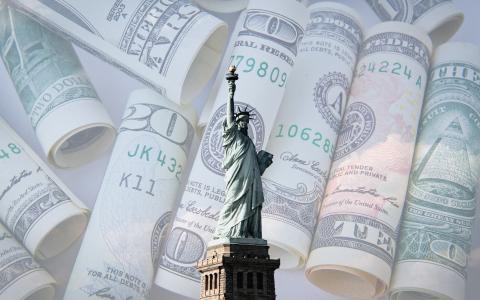
(Yahoo! Finance) - Ongoing uncertainty around tariffs was one of many issues before Treasury secretary pick Scott Bessent as he faced the Senate Thursday and asked for confirmation as Donald Trump’s top economic official.
Bessent opened the hearing by touting the president-elect for his trade plans and then repeatedly defended high duties under questioning from both Democratic and Republicans senators.
He said that a range of tariff ideas — including the controversial blanket ones that Trump promised on the campaign trail — will be part of the Trump 2.0 equation in the months ahead.
At one point during the questioning, he described Trump’s tariff policy as one with a plank that includes "a more generalized tariff as a revenue raiser for the federal budget” as he also downplayed potential costs for such a policy.
Other parts of the Trump tariff agenda, the anticipated nominee said, would be focused on using tariffs as a negotiating tool to remedy unfair trade practices and other geopolitical issues.
Tariffs came up amid a discussion of a wide array of topics, from tax cuts to the ballooning national debt to the role of sanctions and even Bessent’s own personal finances.
The Federal Reserve also came up, with Trump’s pick defending the independence of the central bank but maintaining that Trump "will have a voice."
Bessent last year suggested in a Barron’s interview that Trump could appoint a "shadow chair" to undermine the influence of Fed Chair Jerome Powell.
He also pushed back on the notion of increasing Treasury involvement in crypto, saying, "I see no reason for the US to have a central bank digital currency."
Under questioning from Sen. Elizabeth Warren, Bessent defended the debt ceiling ahead of a coming debate on that topic. But he also appeared open to abolishing the limit on US borrowing if Trump made it a priority.
The conversation returned again and again to perhaps the most pressing short-term question for markets: tariffs.
The emerging Trump/Bessent strategy could receive pushback from the business community. One example of that came Thursday when the US Chamber of Commerce rolled out its annual "State of American Business" report. One of the top recommendations? A push for the president-elect to stay away from sweeping tariffs.
But Bessent nonetheless made clear that heavy duties remain likely and that they were a strategy he would support.
Under questioning by Ron Wyden, the top Democrat on the committee, about the effect of blanket tariffs, Bessent tried to downplay the potential costs as the Oregon senator charged American consumers would be “clobbered by this.”
"Senator, I would respectfully disagree, and the history of tariffs and optimal tariff theory does not support what you're saying,” he responded to Wyden, saying that a 10% tariff — one Trump often promised on the 2024 campaign — would appreciate currency by only 4% and could be further tempered by changing behavior.
Trump has declined to offer many details on his tariff plans as of late but posted on social media on Tuesday to announce plans for an "External Revenue Service" as a clearinghouse for various expanded tariff collections.
At another point in Thursday’s hearing, when Bessent was pressed by Sen. Maggie Hassan of New Hampshire about whether any of Trump's policies could raise prices, Bessent responded, "Nothing I can immediately think of."
Tariffs are a policy that economists have repeatedly focused on as being inflationary. The duties — which are collected on companies at ports of entry — often are largely passed on to consumers, as was the case with tariffs on washing machines during Trump’s first term.
In the past, Bessent has offered more nuanced tariff messages.
During his extended campaign for the nod from Trump last fall, Bessent fashioned himself as a champion of tariffs in a FoxNews.com op-ed — as long as they are “used strategically.”
He has been more openly critical in other contexts, writing less than a year ago in a letter to his firm's partners that “tariffs are inflationary and would strengthen the dollar — hardly a good starting point for a US industrial renaissance.”
A range of other issues, including Bessent’s own finances
The hearing was also notable for an early focus on Bessent’s own finances, specifically a Democratic vetting document that circulated before the hearing.
The document, based on a review of his tax filings, charged that Bessent avoided paying hundreds of thousands of dollars in Medicare taxes due to questionable deductions.
Wyden also highlighted the issue in his opening remarks, saying, “Like a lot of Wall Street fund managers, Mr. Bessent makes use of a tricky legal maneuver to opt out of paying into Medicare.” He also noted that the Treasury Department has previously argued that the maneuver amounts to a violation of tax law.
Meanwhile, his GOP colleague, Mike Crapo of Idaho, praised and defended Bessent repeatedly, saying, “It is clear that you followed applicable law and provided thousands of pages of documentation that substantiate your positions — positions supported by major law and accounting firms."
It set the tone for a moderately more contentious hearing than was expected. But it didn't initially appear likely to change the current high odds of Bessent’s confirmation, with only Republican votes needed for approval.
Bessent is also still expected to receive at least some Democratic votes, with Senate Majority Leader Chuck Schumer smiling alongside the pick during a photo opportunity the day before the hearing.
And Thursday's hearing, while contentious in parts, was a stark early contrast to the tense tone of other gatherings this week like those for Pete Hegseth and Pam Bondi.
And on Thursday, Republicans on the panel appeared to be fully on board with Bessent.
"I'm still going to vote for your nomination," joked Republican Senator John Cornyn at one point in a lighthearted moment where the Texan and Bessent, a South Carolinian, touted growth rates in their respective home states.
By Ben Werschkul - Washington Correspondent



